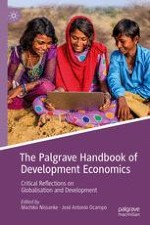2019 | OriginalPaper | Buchkapitel
10. Income Inequality in Developing Countries, Past and Present
verfasst von : Rolph van der Hoeven
Erschienen in: The Palgrave Handbook of Development Economics
Verlag: Springer International Publishing
Aktivieren Sie unsere intelligente Suche, um passende Fachinhalte oder Patente zu finden.
Wählen Sie Textabschnitte aus um mit Künstlicher Intelligenz passenden Patente zu finden. powered by
Markieren Sie Textabschnitte, um KI-gestützt weitere passende Inhalte zu finden. powered by
